- Home
- Andre Dubus III
The Cage Keeper and Other Stories Page 3
The Cage Keeper and Other Stories Read online
Page 3
“We’re in Niwot.”
“That is correct.” He puts that huge knife point to my jacket side. “There’s a Sunoco station up here to your right. It’s full service.” He lowers the liquor bottle down between his legs onto the floor, and I pull in alongside the pumps. Dirty snow is plowed up against the side of the building. A young guy is inside reading a magazine. He’s leaning back in a chair and has his feet up on his desk. I honk the horn and the kid looks up then stands to get his coat that’s hanging behind him. I think about Wilson, about how maybe he should have noticed my fogged-up windows in the back alley when he pulled up on his motorcycle. Maybe he could have looked and thought about it for just one second. Elroy slips the knife between the car seat and where my kidneys are as the kid comes out of the building. He’s rubbing his hands together and his breath is shooting out in front of him in short foggy blasts.
“Mornin’,” he says.
I’m about to speak but then Elroy leans in front of me. “Fill it up, son.”
“Yessir.”
A frigid breeze is coming in steady through the window. I start to reach for the handle. “Mind if I roll the window up?”
“Yes, I do, Al. That air is good for you. Keep you awake. Get out your money.”
I reach around and get my wallet. He takes it from me then opens it and takes out all I got, a twenty and two ones.
“I didn’t think you were making millions over at Fascist House.”
I sit there in the cold, smelling gasoline. The attendant hangs up the nozzle, then comes around to the window.
“Eight-seventy.”
Elroy presses that Bowie flat against my lower back as he leans in front of me and hands the kid my twenty. “Hey partner, I wonder if you’d be willing to bring us four black coffees from your machine I see in there. I’d be happy to give you a couple extra dollars for your trouble.”
I’m looking straight into this kid’s face. He’s got a few pink pimples on his chin and forehead, and I’m looking right into his watery brown eyes, moving mine all around then shooting them in the direction of Elroy beside me. The kid just smiles at me like he understands how it is to be with senile grandfathers or something. Then he says, “Sure. No problem.”
IT WAS JUST AFTER Elroy had me get off 119 past Longmont, heading north on Highway 25, when I realized nobody would be missing me for at least two whole days. I’m not due back at the center until Friday, so unless someone saw a gray-haired man pop my car door lock then climb into my Monte Carlo with a huge knife in his hand, nobody would connect us. When this hit me, my heart started beating fast and my hands got slick on the wheel. I leaned forward a little in my seat to take a breath but then spilled coffee between my legs onto my crotch. A hot wave passed through me and for a second I felt like I was going to throw up. All of this Elroy didn’t seem to notice; he just kept sitting there in the dark holding his Styrofoam cup of coffee in one hand, his Bowie knife in the other, leaning his head back against the seat and watching the white lines of route 25 come into my headlight space then pass under us like they were medicine for his old bones, water for a man in the desert. But then he turned to me and said: “No one will be looking for a sky blue Monte Carlo for two days anyway, will they, Al?” And I couldn’t say anything. Not a word came from my lips. And in the back of my head somewhere I realized I had been hoping that this hadn’t been planned at all, that he had just jumped off the wagon after work and flipped out, that after he sobered up he was bound to calm down, realize how rash he had been, and have me drive him back to face the music. But then what about the knife? I hadn’t been letting myself think about that. Now that is all I am thinking about. If he’s smart enough to rip off a car and a driver nobody’s going to miss for forty-eight hours, if that’s part one, then what’s part two? And as we pass through the tiny sleeping town of Rimnath heading towards Bellington, my throat dry from coffee, my palms slippery with sweat, I just turn to him and ask him straight out, “Are you going to kill me, Elroy?”
He looks at me and I can barely make out his expression in the early morning darkness, but I know that it has changed. That look isn’t on his face anymore, and his eyes have softened somehow, like all of a sudden nothing is funny to them or ever will be again.
“I do not enjoy killing, Al. It is not a hobby for me.”
I look back at the road and hear him sip from his bottle.
“Though I have done it, haven’t I? As a soldier and a civilian I have done it. Just make sure you do it wearing their colors is all I can say. ’Cause mister, if you don’t—”
I look at him for a second. He is looking straight at me. I look back at the road.
“You are a cage keeper, Al. I can see you take your job seriously, too. You want to be a good cage keeper. Maybe someday run one like your brother, Mark, back at Fascist House. You are a good cop, Al. That is what you want to be. Just don’t try being one now, kid. I do not fancy the idea of snuffing you out, but I will if you start to play hero with me. I will slit you open like a fish.”
I look at him then look back at the road, then look at him again. “You won’t get any trouble from me, Mr. McElroy.”
He nods without a word and I go back to my driving. I want to check my watch but he still has his eyes on me; I don’t want him to wonder anything crazy. The sky is still very dark, no beginning signs of daybreak, but it can’t be more than a couple hours away. We pass through Bellington, just a short stretch of one-room stores with faded lettering in their windows, some framed with Christmas lights that cast orange and red and blue onto the empty sidewalk. We come to an intersection with a blinking yellow light and I keep going but up ahead on the left is a brightly lit Winchell’s Donuts. The only customer in it is a very fat police officer sitting at the counter with his back to the glass.
“Don’t even think of speeding up or doing anything else to attract that pig’s attention.”
That huge horse castrater is at my side. I look away from the doughnut shop as we leave Bellington and enter again the darkness of route 25 heading north.
I HAVE NEVER BEEN IN Wyoming before, I am there now. We passed through Cheyenne shortly before five o’clock this morning and were out of there in no time. The highway runs to the west of it and as we passed this flat frontier metropolis, I looked past Elroy’s caveman profile to the still-lighted streetlamps at the base of the buildings; I saw the red taillights of a Trailways bus that was heading down one of the streets towards the center of the city and I thought then how I would like to be on that bus, how I have always liked buses, how I slept on one almost the whole day-and-a-half trip down to Fort Lauderdale with Gus and Lopes spring break our sophomore year. While I slept they drank beer that we had smuggled in after a stop in Georgia. But I just couldn’t stay awake in the soft jolts and vibrations of that moving bus. That’s what I thought of as this cutthroat bastard and I passed Cheyenne and hit the snow prairies of Wyoming just in time for sunrise. At first there was a pale lip of pink on the horizon. Then the sun was totally exposed, looking as orange and round as an egg yolk. Now it is daylight and I find myself driving alongside men and women in cars and trucks and vans on their way to work. I look over at McElroy and he is looking at me. I wonder how long he has been doing that. Then I see him stick his thumb and forefinger into his mouth and pull out his teeth. He wipes them on his pant leg but keeps his bloodshot eyes on me. The center of his face just caved into the gaping hole under his nose. He looks like a lamprey eel. I look back at the road as he clicks his teeth into his mouth, then sits up and spits something onto the floor of my car.
“There is a plan here, Al. There is a plan.” He looks at me, waiting for my reaction like we’re two chums on a vacation together or something. “We’re going straight up into Canada, kid. You are goin’ to drive. But we will travel only by night. We will sleep by day. The border can’t be more than seven hundred miles north of us if I am not mistaken, course we will have to get a map. Do you have a map?”
I shake my h
ead, though I think my Rand-McNally is still folded up in my glove compartment.
“No matter.” He puts the knife between his legs and rubs his hands together. He looks out the windshield then reaches over and turns off the heat. “With luck and proper precautions I see no reason why you can’t have me safely in the province of Saskatchewan by midmorning tomorrow.” He picks up the knife again and then points it straight ahead at the highway. “I want you to pull into the next rest area. That is all you need to know for now.” He lowers the Bowie to his lap and I look to my right hoping somebody might have seen this ugly man with the bushy gray eyebrows waving a knife around. I see a guy in an orange Datsun 240 Z. He is looking straight at us but not with the expression of someone concerned. He’s got on glasses and is going bald. His shirt collar is too tight for his neck. He looks like my dad.
We are halfway to Casper before I see a rest area sign and get into the right lane to exit. I glance at my watch. It’s seven twenty-two. We are driving through some of the flattest country I have ever seen, and it’s all covered with snow. A sign says: WHEATLAND 8 MILES. I pull into the rest area, a plowed parking lot lined with a few trees. There’s a concrete rest-room building in the middle and Elroy has me go way off in the corner away from a parked eighteen wheeler. I pull in under the snow-weighted branch of a tall spruce and I think of the Christmas tree standing in the corner of the mess hall back at the center. I’m tired. My bladder’s full. I don’t even feel very scared right now.
“We will both go to the latrine, Al. You will walk in front of me. That trucker is fast asleep in his rig, so you can stop thinking of him coming to your rescue. Also, I am quite adept at throwing this knife and making it stick. Get the picture?”
“Yes.”
“Good. Get out of the car after me.”
After we finish urinating and splashing water on our faces Elroy has me open my trunk to see I don’t know what. He lifts my spare tire and looks at the empty space beneath it. Then he opens my toolbox and rummages through that. There’s a slow wind coming from the ice fields behind the rest room. It’s going right through my jacket. It’s freezing the water left over on my face. I look at Elroy bending over into my trunk then think of myself taking one step forward and slamming the lid down on his head. My blood’s rushing through my temples as I see it happening, but again, my body doesn’t make a move. Then he finds what I forgot I had there: a short coil of heavy tow rope Mark lent me this past August after my car stalled for the second time in downtown Denver. Elroy straightens then closes the trunk, his knife handle sticking out of his heavy jeans jacket pocket, my brother’s rope in his hand.
“Get in the front seat, Al. It’s bedtime.”
IN THE LAST SIX or seven hours I have probably slept two. My leather jacket is bunched up between my shoulder blades. My toes are frozen solid. And I see my breath shoot in front of me every time I exhale. Right now I’m looking straight up past my steering wheel and out of my windshield at the branches of the spruce tree we parked under. I can see the sky through them. It must be around two or three o’clock, though the way my hands are tied to the steering wheel I don’t feel like straining my neck muscles to check my watch and see. The rope runs down my body, joins my feet and legs together, and is tied to the armrest of the passenger door. My legs are bent up in a right angle and my butt is resting on the hump between the seats. Elroy’s got the remaining rope tied to his wrist in the back, or so he told me just before he went to sleep. He is the most quiet sleeper I have ever not heard. You can hardly hear him breathe even. More than once I shined my light in his sleeping face back at the center just to make sure he hadn’t died. And more than once he would wake up cussing about his civil rights and invasion of privacy and every other piece of legal horse-shit that came to his immediately alert brain. But no such luck now; he is definitely alive and breathing in the backseat of my car. I can feel it through the rope.
A little while after he nodded off I heard the eighteen wheeler start up. I prayed that the driver would pull close enough to my car to look down and catch a glimpse of a guy tied up in the front seat. But he just meshed his gears and was gone. Now, hours later, the insides of all the windows are fogged up with my and Elroy’s breathing. So nobody’s going to see us by accident unless they open a door, which is what I am hoping now, that a passing state trooper will pull in to check on the lone parked car with the misted-over windows. But I can’t even concentrate on that. My mind is just bouncing around from one wired thought to another. I still can’t forgive myself for not clocking Elroy with the trunk lid. One hard whack; that’s all it would’ve taken. Or I could have at least pulled the knife out of his jacket pocket and thrown it onto the highway, then made a run for it. I hear the cars passing by and I think of all those Jews who just climbed into those trains knowing they were being sent to their deaths. I remember seeing film footage of that in a sociology course back at Syracuse. There must have been one hundred people to each Nazi with a machine gun, but nobody even gave the guy eye contact. They just helped each other into the cattle cars without a word. I couldn’t understand that then. I’ve always kind of agreed with the old adage that right makes might. I’m not sure about all of that tied up in the cold of my own car though. I know I’m right but I can’t seem to make a move around this animal who, with his bare hands, beat to death some innocent guy on an army base a few years ago. And I don’t even know if it’s just fear that keeps paralyzing me. But I do know this: I’ve got to let myself sleep. I’ve got to rest and clear my head. The cold’s not bothering me much anymore. Except for my fingers and nose, I feel sufficiently numb all over. I close my eyes and breathe deeply. The caffeine has worn off and my heart has slowed back down to normal. With each breath I’m telling every frozen muscle in my body to let go. At least my wool cap is still on my head. I think of my eighth-grade teacher, Ms. Farnes, telling us how forty percent of a person’s body heat can leave an uncovered head. I see and hear other people in my life. The voices of some are in the mouths of others. Then I am no longer tied up in the front seat of my Monte Carlo; I see my father getting out of our station wagon. I have been playing one-on-one with Mark and am all sweaty and dirty and feel good. My father’s tie is loosened and his collar is unbuttoned. His glasses are in his left shirt pocket, but not in his case. He looks sick, like he is about to throw up, and I can see that his eyes are red. I say: “Hey Dad, what’re you, sloshed?” He turns towards me, then walks as steadily as any human being ever walked in his life. He hugs me harder than he ever hugged me before. He looks over my head at Mark coming out of the house, the screen door slamming behind him, then, in words that don’t have enough air behind them, he says, “Oh sweet Jesus. Somebody has killed your mother.”
HUNGER IS WHAT woke me. Hunger and cold. My eyes feel like two desert pools dried up in my head, so I know I haven’t slept enough. The car smells like Elroy’s booze breath and I can’t see through the frost of the windshield, but night has definitely fallen. I stretch my neck and turn my wrist through the rope. It’s six-seventeen on my digital watch. I let my head fall back and my cap comes off. I can’t remember ever being this hungry before. I think the circulation has been cut off in my hands and feet. And my butt has frozen itself to the hump between the seats. I want to clear my bowels and brush my teeth. I can’t hear Elroy’s breathing but, again, that’s nothing new. I rest my head back on my cap and think of sticking that huge Bowie into his gut when I hear somebody whistling outside. It’s a cheerful dopey tune; something Roy Rogers would whistle to Trigger. Christ, maybe it’s a cop. The back door opens, the ceiling light goes on, and Douglas Agnes McElroy sticks his head inside.
“Rise and shine, Alley Oop. You got some driving to do.” He leans in between the bucket seats, puts the Bowie handle between his teeth, then unties my feet. He gets the knot loosened on my hands and as soon as he pulls the rope away from my wrists, he takes the knife from his mouth and rests the point of it on my chin. “I’m figuring it feels like the real thing to
you now, son. Do not forget what I told you about playing hero with me. I propose to get through this all right. I suggest you do the same.”
“I’m hungry.”
“We will go take care of our toiletries. Food will be our first priority after that.”
THERE IS SOMETHING about ordering food from a plastic clown when you’ve got a convicted murderer at your side with his Bowie pressed against your jacket that makes you feel you might have died and gone to another planet. I got over this feeling and ordered four super-large tacos and two large Cokes from what sounded like a high school girl. When I pulled around to the pickup window she looked down and smiled at me and told me the price again: six fifty-seven. Her eyes were dark brown and so was her hair, but she had thin pale arms that seemed out of place when you saw how large her breasts were. She reminded me of Angela Nickerson, Maggie’s daughter, and when I handed her my money I didn’t even give her a signal that things weren’t so cool in my car. I just looked into her eyes, dark as a deer’s, and thought about that little homemade Christmas tree in Maggie’s room back at the center. I thought of that, and Angela, and pieces of her father’s skull lying on the floor at her feet, and how I hadn’t shaved or brushed my teeth and would like to. And when she gave me my change, handed me my food, and smiled her business smile, I couldn’t smile back. I was looking at her thin arms holding that bag of food out in the winter air for me to take, and I thought how weak they looked, how they seemed to be straining with just the weight of a few tacos and a couple Cokes. I was staring at a little brown mole on her white forearm and went into a gaze, one of those times when your mind and eyes just decide to lock in on something then space out on you until you can almost feel the drool on your chin. “Here’s your food, sir.”

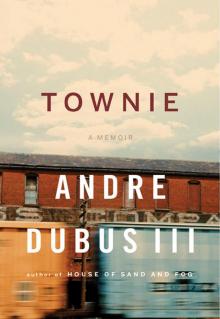 Townie
Townie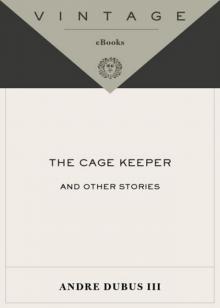 The Cage Keeper and Other Stories
The Cage Keeper and Other Stories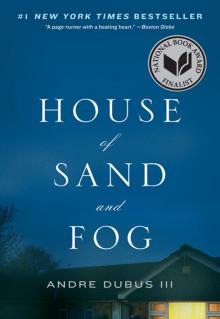 House of Sand and Fog: A Novel
House of Sand and Fog: A Novel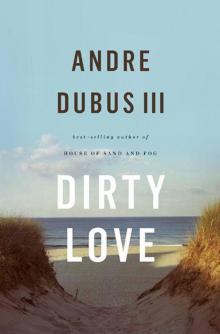 Dirty Love
Dirty Love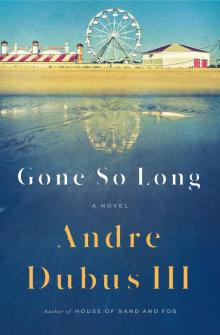 Gone So Long
Gone So Long The Garden of Last Days
The Garden of Last Days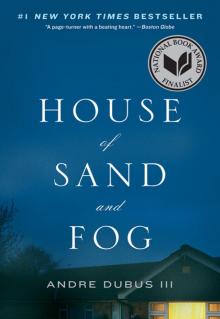 House of Sand and Fog
House of Sand and Fog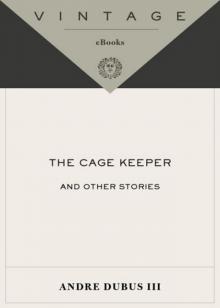 The Cage Keeper
The Cage Keeper